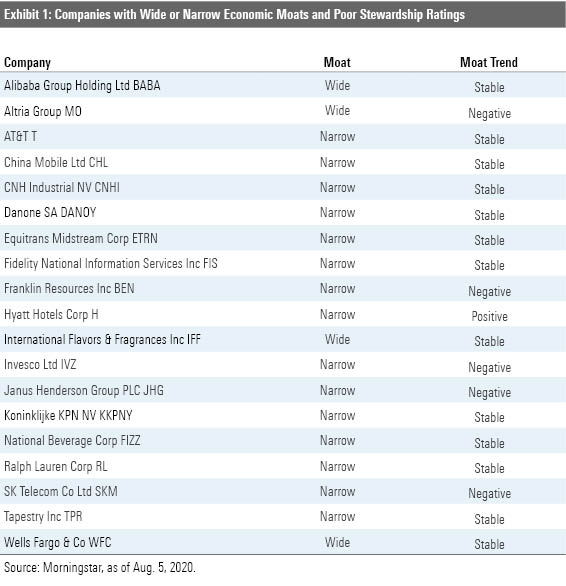
Life is filled with incongruities: working vacations, old news, friendly takeovers, to name just a few. Along those same lines in investing, we have what Morningstar would dub good companies with bad stewardship.
These are companies that have carved out significant advantages (or economic moats) and are therefore quite likely to withstand the slings and arrows from competitors, but they've built those moats in spite of what we consider to be poor management.
We’ve screened for companies that are competitively sound but not especially shareholder-friendly. Specifically, we searched for wide- and narrow-moat stocks with Poor stewardship ratings. Nineteen stocks made the list.

Here's a closer look at the stewardship of three of the names from the list:
Altria Group (MO)
Philip Gorham, director of Equity Research at Morningstar, gives the company a Poor stewardship rating "in light of the unjustifiable valuation paid for [its acquisition of] JUUL”. Indeed, the $12.8 billion investment valued the vaping competitor at a whopping $38 billion, according to Pitchbook data, and only several months after a previous capital-raising round had valued the company at less than half this level. “Even if management's long-term cash flow targets, largely driven by international expansion, are met, we find it difficult to justify this valuation,” says Gorham.
However, he adds: “We applaud the company's focus on maximising cash flow from the declining cigarette business while maintaining market share and leveraging pricing power.” Altria has extracted a strong performance from the brands, particularly Copenhagen, which has grown volume at a high-single-digit rate during the past decade, and won share.
Dividends are the company's top capital allocation priority. The stated payout ratio target is 80% on an adjusted basis, which is probably appropriate, given the very few M&A alternatives in the tobacco space. “It leaves little room for manoeuvre, however, if the firm wished to engage in one of the few legitimate targets such as Juul, or to step up its investment in next-generation products,” says Gorham.
AT&T (T)
Morningstar's Mike Hodel believes AT&T’s recent capital allocation decisions have destroyed shareholder value, resulting in its Poor stewardship rating.
Since Randall Stephenson took over as chief executive in 2007, AT&T’s shares have returned about 3.1% annually, with dividends reinvested, trailing Verizon (7.9%), Comcast (10.0%), and the S&P 500 (6.5%) by wide margins. AT&T has, however, outperformed smaller peers like CenturyLink and Frontier, where stewardship has also been lacklustre. Stephenson plans to retire at the end of June 2020.
Hodel, in particular, disagrees with the firm's decision to buy DirecTV at a premium price: “AT&T’s subsequent acquisition of Time Warner, also at a premium price, looks to us like an admission that the DirecTV deal hasn’t delivered the content advantages AT&T had sought,” he says.
Last but not least, Stephenson’s leadership has come into question with the involvement of activist investor Elliott Capital: “Elliott chose to go public with its concerns regarding AT&T after longtime Stephenson lieutenant John Stankey was promoted to the role of president and chief operating officer, making him heir apparent." AT&T recently made Stankey’s promotion official, announcing that he will take the reins from July 1, 2020. With AT&T for more than 30 years, Stankey was tasked with running WarnerMedia after the acquisition. Heavy executive turnover at Warner was among Elliott’s concerns.
Wells Fargo (WFC)
Eric Compton, equity analyst at Morningstar, rates Wells Fargo's stewardship as Poor as the bank has struggled mightily over the past several years, underperforming peers, and “has not been good behind the scenes".
“We originally held off assigning the bank a Poor rating, given all the personnel changes among the board and management, as well the internal reforms that were supposed to be occurring,” he says. “However, the details of the reports suggest that progress has been poor, and even new board members were as bad as the previous ones.”
He firmly states that until chief exec Charles Scharf proves that stewardship at Wells Fargo has improved, the company will maintain a Poor stewardship rating - issues at Wells over the past several years have been many, such as submitting unsatisfactory resolution plans to the Fed multiple times and being unable to get past its multiple scandals.
“We hope that Scharf will bring a more realistic and effective tenure of management for Wells, and indeed, Scharf has made a number of notable hires, changing the reporting structure, and has promised that there are many opportunities for cost-cutting. Time will tell if Scharf will be the one to turn Wells around.”
This article originally appeared on Morningstar.com



























